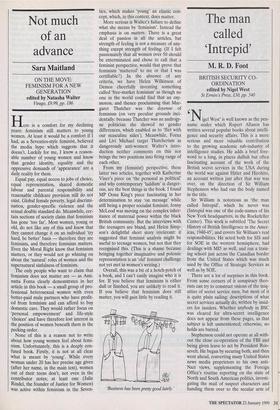Not much of an advance
Sara Maitland
ON THE MOVE: FEMINISM FOR A NEW GENERATION edited by Natasha Walter Virago, £9.99, pp. 186 Here is a comfort for my declining years: feminism still matters to young women. At least it would be a comfort if I had, as a Seventies-style feminist, believed the media hype which suggests that it doesn't. Luckily for me, I know a reason- able number of young women and know that gender identity, equality and the oppressive demands of 'appearance' are a daily reality for them.
Equal pay, equal access to jobs of choice, equal representation, shared domestic labour and parental responsibility and reasonable childcare provision still do not exist. Global female poverty, legal discrimi- nation, gender-specific violence and the sexual double standard do. Meanwhile, cer- tain sections of society claim that feminism has gone `too far'. Most women, young or old, do not like any of this and know that they cannot change it on an individual 'try hard, be better' basis — therefore they are feminists, and therefore feminism matters. Even the Moral Right know that feminism matters, or they would not go whining on about the 'natural' roles of women and the supernatural sinfulness of feminists.
The only people who want to claim that feminism does not matter are — as Ami- natta Forna clearly demonstrates in her article in this book — a small group of pro- fessional heterosexual women with even better-paid male partners who have profit- ed from feminism and can afford to buy domestic care. They would rather focus on `personal empowerment' and life-style `choices' and have therefore lost interest in the position of women beneath them in the pecking order.
None of this is a reason not to write about how young women feel about femi- nism. Unfortunately, this is a deeply con- fused book. Firstly, it is not at all clear what is meant by 'young'. While every woman under 20 has her precise age given (after her name, in the main text), women out of their teens don't, not even in the contributor notes; at least one (Julie Rindel, the founder of Justice for Women) was active within feminism in the Seven- ties, which makes 'young' an elastic con- cept, which, in this context, does matter.
More serious is Walter's failure to define what she means by 'feminism'. Instead the emphasis is on matters. There is a great deal of passion in all the articles, but strength of feeling is not a measure of any- thing except strength of feeling. (If I felt passionately that all women over 50 should be exterminated and chose to call that a feminist perspective, would that prove that feminism 'mattered' to me or that I was certifiable?) In the absence of any criteria, we have Helen Wilkinson of Demos cheerfully inventing something called 'free-market feminism' as though no one in the world could find that an oxy- moron, and thence proclaiming that Mar- garet Thatcher was the doyenne of feminism (on very peculiar grounds inci- dentally: because Thatcher was an androgy- ne politician she showed no gender differences, which enabled us to 'flirt with our masculine sides'). Meanwhile, Forna and Livi Michael target Thatcherism as dangerously anti-women: Walter's intro- duction neither comments on this nor brings the two positions into firing range of each other.
From my (feminist) perspective, these latter two articles, together with Katherine Viner's piece on 'the personal as political' and why contemporary `laddism' is danger- ous, are the best things in the book. I found MP Oona King's piece fascinating in her determination to stay 'on message' while still being a proper socialist feminist; Jenny McLeod was moving on the complex inher- itance of maternal power within the black British community. But the interviews with the teenagers are bland, and Helen Simp- son's delightful short story irrelevant: it suggested that feminist analysis might be useful to teenage women, but not that they recognised this. (This is a shame because bringing together imaginative and polemic representation is an 'old' feminist challenge not yet met in women's writing.) Overall, this was a bit of a hotch-potch of a book, and I can't easily imagine who it is for. If you believe that feminism is either dull or finished, you are unlikely to read it. If you believe that feminism does still matter, you will gain little by reading it.
Business has been pretty good lately.'


























































 Previous page
Previous page